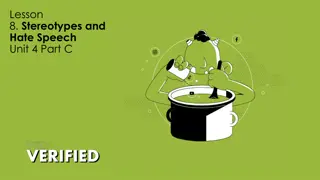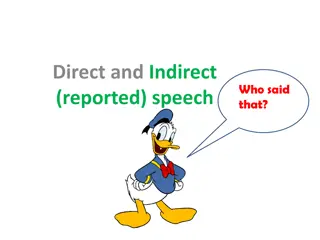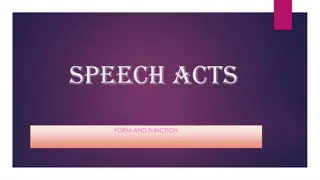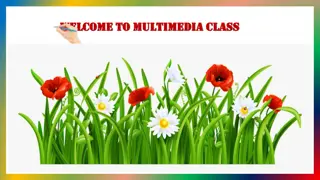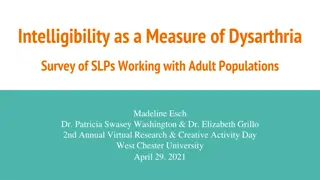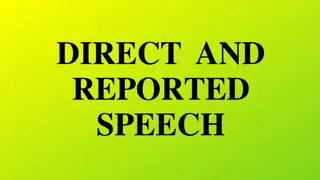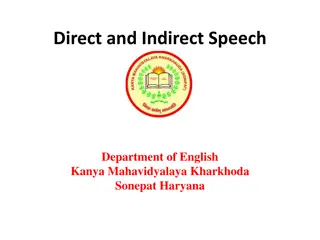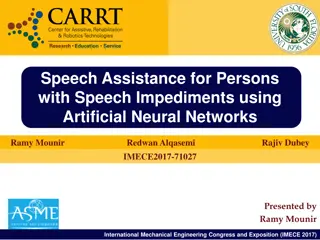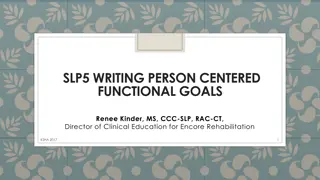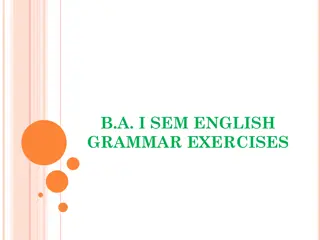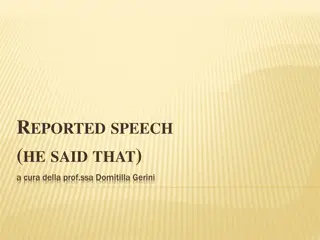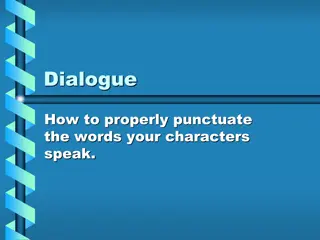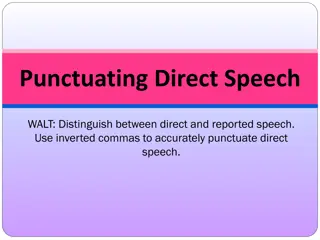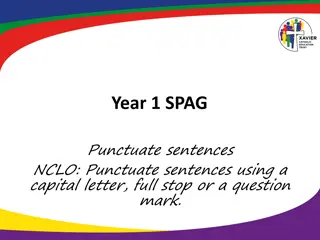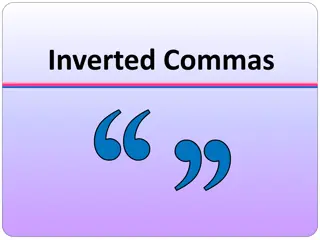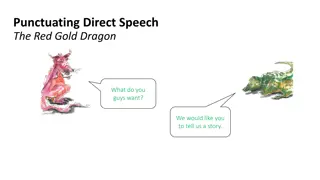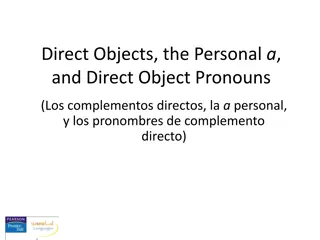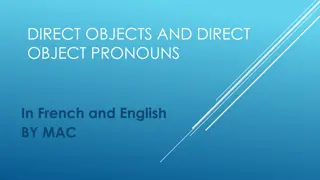Mastering Punctuating Direct Speech
Explore the importance of using inverted commas in direct speech to distinguish it from reported speech. Learn the rules for punctuating direct speech correctly, such as placing inverted commas around spoken words, using capital letters, and adding appropriate punctuation. Practice your skills with examples and challenge yourself to rewrite text with accurate punctuation.
Download Presentation

Please find below an Image/Link to download the presentation.
The content on the website is provided AS IS for your information and personal use only. It may not be sold, licensed, or shared on other websites without obtaining consent from the author.If you encounter any issues during the download, it is possible that the publisher has removed the file from their server.
You are allowed to download the files provided on this website for personal or commercial use, subject to the condition that they are used lawfully. All files are the property of their respective owners.
The content on the website is provided AS IS for your information and personal use only. It may not be sold, licensed, or shared on other websites without obtaining consent from the author.
E N D
Presentation Transcript
Punctuating Direct Speech WALT: Distinguish between direct and reported speech. Use inverted commas to accurately punctuate direct speech.
Inverted Commas Inverted commas are also known as speech marks. They are used to show when someone is speaking. Although it may look complicated, by following just a few simple rules you can become an expert at punctuating direct speech.
Rules for Punctuating Direct Speech 1. Place around the words which are spoken. 2. Use a capital letter at the start of a speech sentence (even if it is in the middle of another sentence). 3. Before you close your inverted commas use a comma, question mark or exclamation mark to separate what was said from the speaker. 4. If a new person speaks, start a new line.
For example: Should we tell the humans we can speak English? asked Stuart. Kevin replied, No, definitely not. http://www.wdsu.com/image/view/-/18289490/medRes/1/-/maxh/480/maxw/640/-/b76s38/-/Minions.jpg The punctuation placed before closing the inverted commas is a ? ? as Stuart asked a question No is capitalised because it is the start start of the speech sentence.
For example: You ll win then, murmured Emery, you re much faster than I am. I ll race you there! said Isla. you re doesn t need a capital letter because it is not not the start of the speech sentence. Despite coming after an ! , said is not not capitalised.
Punctuating Direct Speech Can you punctuate the speech in these sentences correctly? Can you punctuate the speech in these sentences correctly? What time are we going out asked Zoe. What time are we going out? Yasmin shouted look out Yasmin shouted, L Look out! ! Besides said Sam thoughtfully what was she doing there anyway Besides, , said Sam thoughtfully, what was she doing there anyway? ? ? asked Zoe. Remember: Put inverted commas around what the speaker says, start each speech sentence with a capital letter and place a piece of punctuation before closing your inverted commas.
Punctuating Direct Speech Can you rewrite this section of text using the correct punctuation? Can you rewrite this section of text using the correct punctuation? did you eat the last doughnut Hannah asked her little brother. no I had carrot sticks for my snack replied Zac innocently. then where questioned Hannah did the sugar all around your mouth come from. smiling mischievously, Zac responded I m not sure, but it definitely wasn t from your doughnut
Punctuating Direct Speech Can you rewrite this section of text using the correct punctuation? Can you rewrite this section of text using the correct punctuation? D Did you eat the last doughnut? ? Hannah asked her little brother. N No, I had carrot sticks for my snack, , replied Zac innocently. T Then where, questioned Hannah, d mouth come from? ? , did the sugar all around your S Smiling mischievously, Zac responded, I definitely wasn t from your doughnut! ! , I m not sure, but it Remember: New speaker, new line.
Synonyms for Said http://41.media.tumblr.com/tumblr_lubt53SraM1qccdb1o1_1280.png
Synonyms for Said Repeatedly using the word said after every speech sentence is a quick way of making your writing very boring for others to read. Keep a thesaurus handy and refer to it when writing dialogue to keep your writing interesting.
Which is correct? Can I have lemonade to drink? Asked Vivian. Can I have lemonade to drink? Asked Vivian. Can I have lemonade to drink? asked Vivian. Can I have lemonade to drink? asked Vivian. Can I have lemonade to drink, asked Vivian. Can I have lemonade to drink, asked Vivian.
Which is correct? Can I have lemonade to drink? Asked Vivian. Can I have lemonade to drink? Asked Vivian. Can I have lemonade to drink? asked Vivian. Can I have lemonade to drink? asked Vivian. Can I have lemonade to drink, asked Vivian. Can I have lemonade to drink, asked Vivian.
Which is correct? Flynn replied, He said he was going to the park . Flynn replied, He said he was going to the park . Flynn replied, he said he was going to the park. Flynn replied, he said he was going to the park. Flynn replied, He said he was going to the park. Flynn replied, He said he was going to the park.
Which is correct? Flynn replied, He said he was going to the park . Flynn replied, He said he was going to the park . Flynn replied, he said he was going to the park. Flynn replied, he said he was going to the park. Flynn replied, He said he was going to the park. Flynn replied, He said he was going to the park.
Which is correct? I think said mum, that we ll go to the zoo today I think said mum, that we ll go to the zoo today I think, said mum, That we ll go to the zoo today. I think, said mum, That we ll go to the zoo today. I think, said mum, that we ll go to the zoo today. I think, said mum, that we ll go to the zoo today.
Which is correct? I think said mum, that we ll go to the zoo today I think said mum, that we ll go to the zoo today I think, said mum, That we ll go to the zoo today. I think, said mum, That we ll go to the zoo today. I think, said mum, that we ll go to the zoo today. I think, said mum, that we ll go to the zoo today.
Which is correct? I love vanilla ice cream exclaimed Zara excitedly. I love vanilla ice cream exclaimed Zara excitedly. I love vanilla ice cream! exclaimed Zara excitedly. I love vanilla ice cream! exclaimed Zara excitedly. I love vanilla ice cream! Exclaimed Zara excitedly. I love vanilla ice cream! Exclaimed Zara excitedly.
Which is correct? I love vanilla ice cream exclaimed Zara excitedly. I love vanilla ice cream exclaimed Zara excitedly. I love vanilla ice cream! exclaimed Zara excitedly. I love vanilla ice cream! exclaimed Zara excitedly. I love vanilla ice cream! Exclaimed Zara excitedly. I love vanilla ice cream! Exclaimed Zara excitedly.
Which is correct? I m really sorry , said Oscar sadly, but I can t come I m really sorry , said Oscar sadly, but I can t come tomorrow. tomorrow. I m really sorry , said Oscar sadly, But I can t come I m really sorry , said Oscar sadly, But I can t come tomorrow. tomorrow. I m really sorry said Oscar sadly, but I can t come I m really sorry said Oscar sadly, but I can t come tomorrow. tomorrow.
Which is correct? I m really sorry , said Oscar sadly, but I can t come I m really sorry , said Oscar sadly, but I can t come tomorrow. tomorrow. I m really sorry , said Oscar sadly, But I can t come I m really sorry , said Oscar sadly, But I can t come tomorrow. tomorrow. I m really sorry said Oscar sadly, but I can t come I m really sorry said Oscar sadly, but I can t come tomorrow. tomorrow.
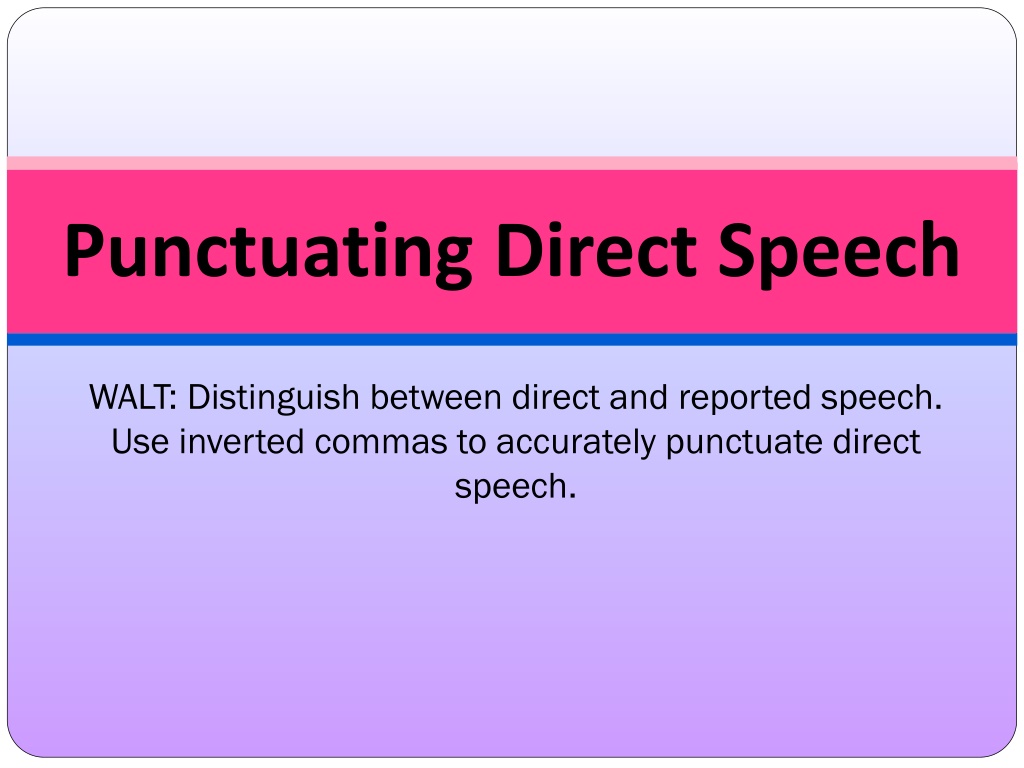

















![Prevention and Combating of Hate Crimes and Hate Speech Bill [B.9B.2018]](/thumb/60513/prevention-and-combating-of-hate-crimes-and-hate-speech-bill-b-9b-2018.jpg)
